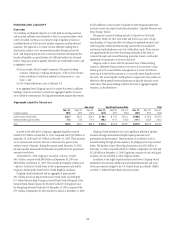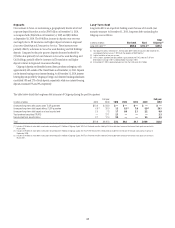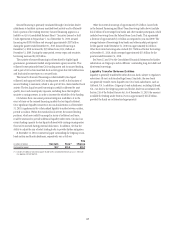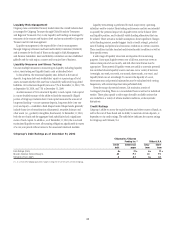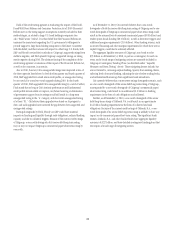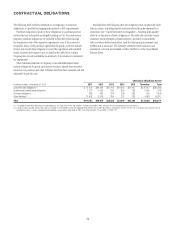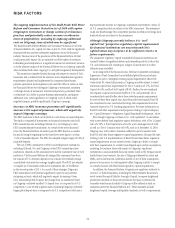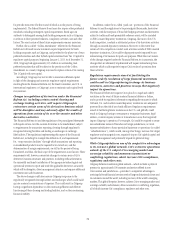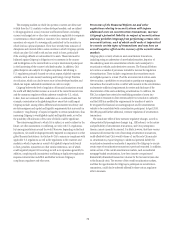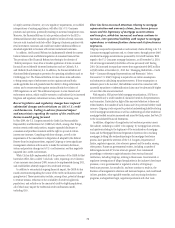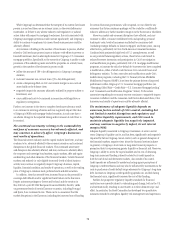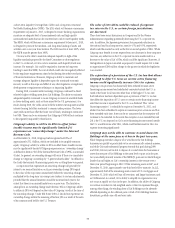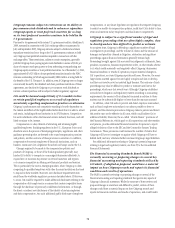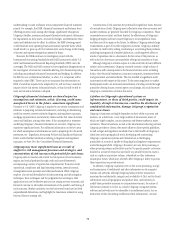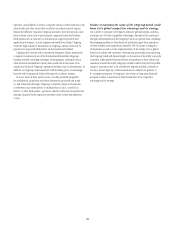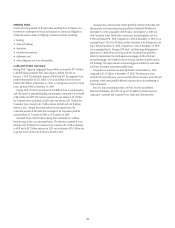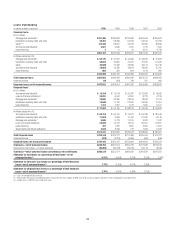Citibank 2010 Annual Report Download - page 76
Download and view the complete annual report
Please find page 76 of the 2010 Citibank annual report below. You can navigate through the pages in the report by either clicking on the pages listed below, or by using the keyword search tool below to find specific information within the annual report.74
The credit rating agencies continuously review the ratings
of Citigroup and its subsidiaries, and have particularly
focused on the impact of the Financial Reform Act on
the ratings support assumptions of U.S. bank holding
companies, including Citigroup. Reductions in Citigroup’s
and its subsidiaries’ credit ratings could have a significant
and immediate impact on Citi’s funding and liquidity
through cash obligations, reduced funding capacity and
collateral triggers.
Each of Citigroup’s and Citibank, N.A.’s long-term/senior debt and short-
term/commercial paper ratings are currently rated investment grade by Fitch,
Moody’s and Standard & Poor’s (S&P). The rating agencies continuously
evaluate Citigroup and its subsidiaries, and their ratings of Citigroup’s and
its subsidiaries’ long-term and short-term debt are based on a number of
factors, including financial strength, as well as factors not entirely within
the control of Citigroup and its subsidiaries, such as conditions affecting the
financial services industry generally.
Moreover, each of Fitch, Moody’s and S&P has indicated that they are
evaluating the impact of the Financial Reform Act on the rating support
assumptions currently included in their methodologies as related to large
U.S. bank holding companies, including Citigroup. These evaluations
are generally a result of the rating agencies’ belief that the Financial
Reform Act, including the establishment and development of the new
orderly liquidation regime, increases the uncertainty regarding the U.S.
government’s willingness and ability to provide extraordinary support to such
companies. Consistent with this belief and to bring Citigroup in line with
other large U.S. banks, during 2010, S&P and Moody’s revised their outlooks
on Citigroup’s supported ratings from stable to negative, and Fitch placed
Citigroup’s supported ratings on negative rating watch. The ultimate timing
of the completion of the credit rating agencies’ evaluations, as well as the
outcomes, is uncertain.
In light of these reviews and the continued focus on the financial services
industry generally, Citigroup and its subsidiaries may not be able to maintain
their current respective ratings. Ratings downgrades by Fitch, Moody’s or
S&P could have a significant and immediate impact on Citi’s funding and
liquidity through cash obligations, reduced funding capacity and collateral
triggers. A reduction in Citigroup’s or its subsidiaries’ credit ratings could also
widen Citi’s credit spreads or otherwise increase its borrowing costs and limit
its access to the capital markets. For additional information on the potential
impact of a reduction in Citigroup’s or its subsidiaries’ credit ratings,
see “Capital Resources and Liquidity—Funding and Liquidity—Credit
Ratings” above.
The restrictions imposed on proprietary trading and funds-
related activities by the Financial Reform Act and the
regulations thereunder will limit Citigroup’s trading for
its own account and could also, depending on the scope of
the final regulations, adversely impact Citigroup’s market-
making activities and force Citi to dispose of certain of its
investments at less than fair market value.
The so-called “Volcker Rule” provisions of the Financial Reform Act restrict
the proprietary trading activities of depository institutions, entities that
own or control depository institutions and their affiliates. The ultimate
contours of the restrictions on proprietary trading will depend on the
final regulations. The rulemaking must address, among other things, the
scope of permissible market-making and hedging activities. The ultimate
outcome of the rulemaking process as to these and other issues is currently
uncertain and, accordingly, so is the level of compliance and monitoring
costs and the degree to which Citigroup’s trading activities, and the results of
operations from those activities, will be negatively impacted. In addition, any
restrictions imposed by final regulations in this area will affect Citigroup’s
trading activities globally, and thus will likely impact it disproportionately
in comparison to foreign financial institutions which will not be subject to
the Volcker Rule provisions of the Financial Reform Act with respect to their
activities outside of the United States.
In addition, the Volcker Rule restricts Citigroup’s funds-related activities,
including Citi’s ability to sponsor or invest in private equity and/or hedge
funds. Under the Financial Reform Act, bank regulators have the flexibility to
provide firms with extensions allowing them to hold their otherwise restricted
investments in private equity and hedge funds for some time beyond
the statutory divestment period. If the regulators elect not to grant such
extensions, Citi could be forced to divest certain of its investments in illiquid
funds in the secondary market on an untimely basis. Based on the illiquid
nature of the investments and the prospect that other industry participants
subject to similar requirements would likely be divesting similar assets at
the same time, such sales could be at substantial discounts to their otherwise
current fair market value.
The establishment of the new Bureau of Consumer
Financial Protection, as well as other provisions of the
Financial Reform Act and ensuing regulations, could affect
Citi’s practices and operations with respect to a number of
its U.S. Consumer businesses and increase its costs.
The Financial Reform Act established the Bureau of Consumer Financial
Protection (CFPB), an independent agency within the Federal Reserve
Board. The CFPB was given rulemaking authority over most providers of
consumer financial services in the U.S. as well as enforcement authority
over the consumer operations of banks with assets over $10 billion, such as
Citibank, N.A. The CFPB was also given interpretive authority with respect
to numerous existing consumer financial services regulations (such as
Regulation Z, Truth in Lending) that were previously interpreted by the
Federal Reserve Board. Because this is an entirely new agency, the impact
on Citigroup, including its retail banking, mortgages and cards businesses,


